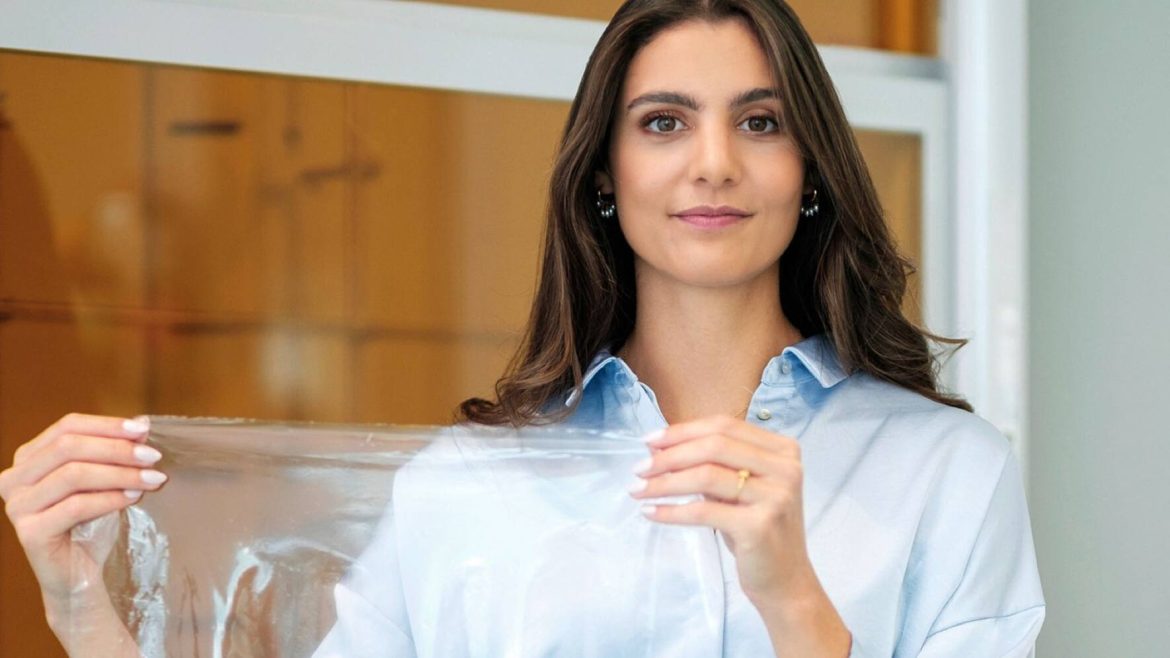“I DON’T DEMONIZE PLASTIC”
Jessica Farda and her tech start-up Noriware are committed to researching and producing plastic alternatives from algae — and thus also to protecting the world’s oceans. Their vision is to sustainably transform the $1.1 trillion packaging industry (of which bioplastic currently accounts for just 1%).
A study by a Dutch research team has shown that an average of 500,000 tons of plastic waste ended up in the oceans every year between 1980 and 2020. This means extreme stress for fauna and flora; especially because, for example, a conventional PET bottle takes up to 450 years to decompose in its environment. Microplastics – according to the European Union definition, all synthetic polymer particles with a size of less than 5 mm – are also an ever-growing problem, particularly in groundwater.“We grew up in a generation where plastic is ubiquitous. This material has not only enabled us to be wealthy, but also to have certain hygiene standards, which is why I don’t demonize plastic per se,” says Jessica Farda, founder of Noriware, explaining her stance on plastic. But the 25-year-old adds that the use of the synthetic material is not necessary in many areas of application and has arisen out of the convenience of industry and society.The idea for Noriware came up while on vacation in Tulum, Mexico: When tons of algae washed up on the beach, the then 23-year-old asked herself how it could be put to good use. When Farda, after her initial research, came across a paper that discussed the polysaccharides naturally occurring in algae, she “fell in love with the topic.” Polysaccharides are used to build solid structures in both plant and animal bodies and are therefore suitable for producing plastic alternatives. When the first experiment to produce a thin, plastic-like film from algae in the shared kitchen was successful, Farda’s vision was clear: “I not only want to use Noriware to create alternatives to plastic, but also the ecosystem by growing algae of the seas.”To produce Noriware packaging, the algae, which are sourced from European seas, are first dried and ground and then the algae powder is enriched with additives and chemically modified. The next step is to press and cut the intermediate product to create granules that can be processed into packaging alternatives in conventional plastic production machines. The founder cannot go into more detail about the process behind Noriware, because the competition in the industry never sleeps — but the competition on the market was an advantage for Farda and her team, especially in the early days of the start-up, as it was based on the technical feasibility the plastic alternatives made from algae could be illustrated.But Farda acknowledges Noriware’s advantages over the competition: «Our technology makes it easier to scale the algae polymer extremely efficiently and cost-effectively than other companies are currently able to.»Noriware will enter the commercial market in 2024 with a low-tech packaging type that is water-soluble and therefore only suitable for dry objects. This means that the algae packaging is completely compostable. In 2025 or 2026, the high-tech version of the first packaging that can hold liquids for a longer period of time will be launched. However, according to Farda, the main application of the advanced packaging type is not to replace traditional PET bottles; However, the founder cannot yet provide any further details.
Noriware was created in collaboration with various universities and research centers. “The development and financing would not have been possible exclusively from the private sector,” reports the founder. The initial collaboration in basic research with the Swiss university ETH was ended due to the distribution of intellectual property rights, “otherwise we would simply not have been investable,” says Farda. Instead, there is currently a cooperation with the University of Applied Sciences Northwestern Switzerland (FHNW).But obstacles also arose in the founding process of Noriware: “I can’t even count how many depths we had to go through this year,” says Farda, pointing out the dark side of entrepreneurship. In particular, the start-up’s first investment round, which started in winter 2022 but lasted until May of this year, was challenging.
This was further reinforced by the fact that the technology behind Noriware was not yet fully developed at the time: “On the one hand, we had customers who wanted our product, but on the other hand, they refused to let us sign a confirmation because our product “We were still at the beginning of development – it was an eternal vicious circle,” says the founder. Despite all the obstacles, 1.1 million CHF was raised through investments, and Farda proudly reports that the Swiss Confederation has guaranteed funding of 1.4 million CHF to further develop the start-up.Jessica Farda also found it challenging to put together her team due to Noriware’s lack of branding at the time, as well as her position as a young female founder in a male-dominated industry. “We don’t know anything other than men founding companies,” says Farda the stereotypical images in society. However, these obstacles were overcome during further development, so that Farda now leads a team of seven.“As an entrepreneur, you experience many lows, but the highs are absolutely unbeatable because you physically see the result of your work in front of you,” concludes Farda. But the downsides shouldn’t be ignored either: «From the outside, everything always looks shiny, but my gray hair shows less glamor,» says the 25-year-old founder with a smile.
Jessica Farda , 25, is the founder of the tech start-up Noriware, which makes plastic alternatives from algae. It is also committed to protecting marine ecosystems.

